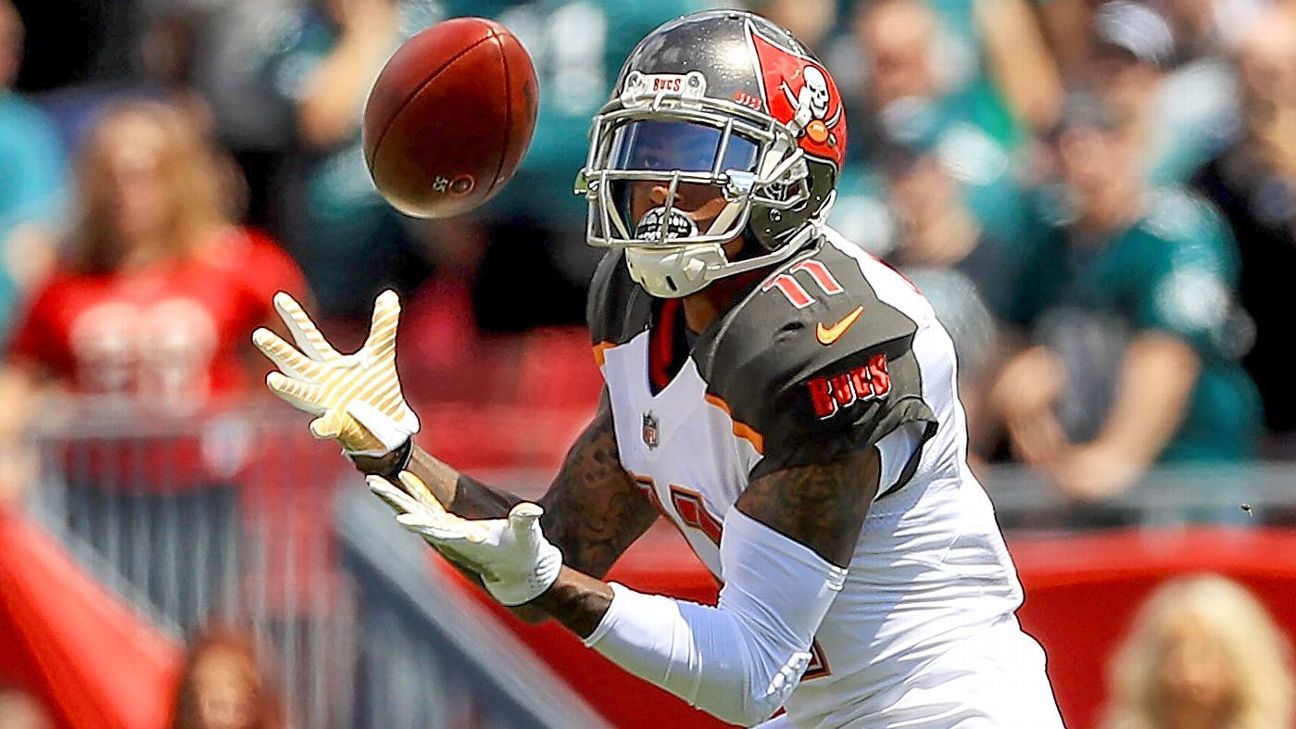TAMPA, Fla. — With free agency rapidly approaching and salary-cap resources low, the Tampa Bay Buccaneers face some big decisions about what to do with some of their higher-paid players, particularly DeSean Jackson.
The wide receiver’s frustrations last season with the previous regime were well-documented, with Jackson reportedly wanting out of Tampa. Can first-year Bucs coach Bruce Arians fix the chemistry and soothe whatever residual feelings possibly left over from the Dirk Koetter regime?
The first step was Arians having a sit-down with Jackson, a conversation the coach said “couldn’t have been any better.”
Here’s a look at the reasons for and against the Buccaneers keeping Jackson:
Why Jackson should stay
He’s fast: The Bucs’ coaching staff believes adding speed on offense is a top priority this offseason. Even at age 32, Jackson is still one of the NFL’s preeminent deep threats. He still can get separation and get open.
“We like speed,” Tampa Bay general manager Jason Licht said at the combine. “Bruce loves speed. [Jackson] fits the bill there. He hasn’t lost a step.”
Can chemistry with Winston be fixed? Arians believes quarterback Jameis Winston has some mechanical issues that need to be worked through — issues such as footwork and throwing off balance. Could those mechanical issues have affected his timing with Jackson?
Winston connected with Jackson on 14 of 34 passes (41.2 percent) in 2018, while Ryan Fitzpatrick connected with Jackson on 27-of-38 (71.1 percent). That’s a colossal difference. On the other hand, Winston and Fitzpatrick had similar completion percentages with Mike Evans (63.4 percent with Winston as compared to 59.6 percent with Fitzpatrick) and Chris Godwin (59.3 percent with Winston, 68.6 percent with Fitzpatrick).
Decoy factor: Even if Winston and Jackson never develop chemistry, having Jackson can be an asset by drawing attention away from other targets — as long as Winston can get him the ball at least a few times each game. Prior to Winston’s benching against the Cincinnati Bengals, he connected with Jackson on a gorgeous 60-yard touchdown, with Jackson outrunning cornerback William Jackson with ease. Those types of plays allow a struggling ground game to get going, can set things up for tight end O.J. Howard underneath and prevent teams from doubling up on Evans.
Why Jackson should go
Money: Jackson carries a $10 million salary-cap hit that could be used now to find a more cost-effective replacement or to upgrade the defense. Linebacker Kwon Alexander, who might be a better fit in a 3-4 defense that allows him to be active up front, is about to hit the open market. Money used on Jackson might be better spent to re-sign Alexander, a player Licht called the “heartbeat of the defense.”
Chemistry with Winston might never develop: The connection isn’t there, and it’s possible it never will be. Sources close to the situation say it’s not that Jackson dislikes Winston as a person; they just haven’t been able to thrive on the field. Those sources also say Jackson didn’t like playing for Koetter, who got into an altercation with Jackson and kicked him out of practice for perceived lack of effort while Jackson was injured.
Hindering development of others: Keeping Jackson around could hamper Godwin, who despite a couple of hiccups last season demonstrated he can be a No. 2 wide receiver. Godwin took most of Jackson’s snaps during OTAs last year while Jackson worked out in California with his longtime trainer, Gary Cablayan. It also could impact younger wide receivers Justin Watson and Bobo Wilson, who were buried on the depth chart last season.
Will Jackson age well? The 32-year-old might have only a few years left. Joey Galloway, who played 17 seasons in the NFL (and reportedly clocked a 4.29 40 time in training at the tender age of 42) is the exception, not the norm. For wideouts whose games are predicated on speed, losing that extra gear can happen quickly. Enabling Jackson to latch on to a contender while allowing the Bucs to move on might be a win-win for both team and player.
Does Jackson want to make this work?
Would Jackson be willing to stay for less money? Considering he can earn $8 million to $10 million on the free-agent market, probably not. What would it look like if the Bucs chose to part ways?
Cutting Jackson: Releasing him now with no guaranteed money left in his deal would save the Bucs $10 million. It also would look like another failed free-agent signing by Licht, although he has said before he has swung and missed, as evidenced by cutting kicker Roberto Aguayo a year after the Bucs drafted him in the second round. Ego shouldn’t get in the way of this.
Trading Jackson: The Bucs also could hold onto Jackson until a trade partner emerges. The Bucs would only be on the hook for the cap and cash up until the point in the season when he is traded. For example, if the Bucs traded Jackson after Week 10, they would be responsible for $5.8 million ($10 million for the salary, divided by 17 weeks, multiplied by 10), with the trade partner responsible for the remaining seven weeks of salary. If that trade partner never emerges, it could look like the Bucs wasted valuable resources on Jackson, instead of building for the future.
